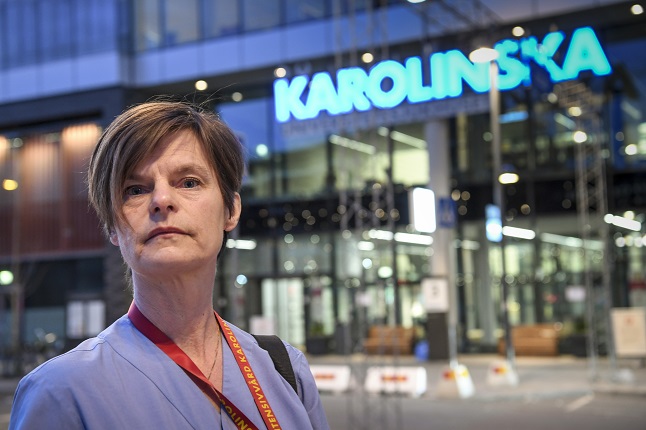
The nurse manning 1177 phone lines: ‘We’ve had to take a lot of anger and upset’
Nurse Sofia Berggren is one of those at the other end of medical helpline 1177, which is the first port of call for many people in Sweden seeking medical advice.
“In the beginning there were lots of phonecalls from people who were worried because, for example, they had a neighbour who had Asian appearance and they wondered if they could get infected by them. We found that there was quite a racist tendency,” she told the TT newswire. “Then there was more focus on winter break travellers who had been in the Alps, and people from Iran.”
Many people have called the number to ask if they can be tested for the coronavirus. As is the case around the world, in Sweden there are not sufficient tests to offer them to everyone with relevant symptoms, so seriously ill people and healthcare workers have been given priority.
“We have had to take a lot of anger and upset. But now I’d say that it’s calmed down a bit. People have a lot of understanding of the fact that the healthcare sector has been brought to its knees.”
The intensive care nurse: ‘It’s under control, but it’s really hard’
“It’s under control, but it’s really hard on several levels,” intensive care nurse Anna Helmerson told the TT newswire.
Helmerson works at the Karolinska University Hospital.
“It’s really tough going into these Covid rooms. You’re closed in for hours in a blanket of plastic, a breathing mask, and a visor which squeezes. You can’t breathe properly, it squeezes your nose and there’s pressure everywhere,” she said.
Another thing that’s tough for staff is knowing that the ban on hospital visits introduced to limit the spread of infection means that the most ill patients cannot get support from their loved ones.
“It’s awfully hard. With the Covid patients, but also for the other patients who are also being cared for in the department as usual. They’re still there, and their relatives can’t come.”
She said that even if older people are the most severely affected by the new virus, it’s important for everyone to understand that young people can get very sick as well.
“We’ve gone up to working 12.5 hours, splitting the day into two shifts instead of three. We do this to be able to do more. With the same staff that previously had 20 beds, we now have around three times as many. It’s working thus far. But we don’t know if this is the eye of the storm or if it will get worse.”
“We like the mountains and we like winter tourism, that’s why we live here. We know that no one goes to the mountains with the goal of getting sick, but we also know that every year we deal with a not insignificant number of tourists at our healthcare centres.
“Usually we will gladly pick you up by helicopter, take care of you with a ventilator, treat you quickly in our specially equipped injury rooms, operate on you successfully, arrange transport by helicopter to your home region’s hospital, but this year it looks different.
“This year you will come to an already strained healthcare sector where the staff who are on site correspond to the low season and where the opportunities to take care of you are limited. So look after yourself and us and stay home this spring. Welcome back after the storm.”
The nurse working with elderly patients: ‘I’m not a superhero’
In a Facebook post which has been liked and shared thousands of times, a nurse named Emma shared a photo of her gloved hand holding an elderly patient’s hand. She wrote: “Dear Diary, Today I have had my toughest shift yet as a nurse.
“I have been relocated to a department that only accepts elderly patients and those with multiple illnesses infected with Covid-19. The department is full. And the referrals are in long queues. The ambulance staff is in gas masks waiting to hand over another patient. Relatives call and cry on the phone.
“All my patients have difficulty breathing and require oxygen. One currently has 12 litres of oxygen (you get ten litres after a cardiac arrest) and still cannot oxygenate properly. When you have difficulty breathing, you get anxiety and panic.
“I feel completely helpless. I’m not a superhero that everyone claims. I am an ordinary girl who with my two arms tries to do everything I can to prevent you from dying. I have tension headaches from my visor and the mouthguard has given me pressure sores on my nose.
“My dear, fragile patient. I know you won’t cope with this. And I see in your eyes that you know it too.”


